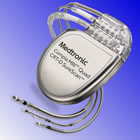According to a Medtronic spokesperson, until now, patients with CRT-Ds have been contraindicated for MRI scans because of the potential harmful interaction between the MRI and device. However, about 40% of CRT patients will need a MRI within four years of receiving a device. As a result, thousands of patients with CRT-Ds do not have access to MRIs, which are used to diagnose conditions such as stroke, cancer and Alzheimer’s disease. These new CRT-D systems provide a beneficial therapy for indicated heart failure patients, reducing the risk of death and offering improvements in quality of life and cardiac function, while allowing patients to safely undergo full body MRI scans, if needed.
Some physicians have stated that, with proper understanding and safety precautions, many patients with devices not rated as "MR-conditional" or "MR-safe" can be imaged without harm. This may be true but, if you read over posts from stent patients in our Patient Forum, MRI operators are seldom willing to proceed without significant assurances.
Medtronic First to Receive FDA Approval for MR-Conditional Cardiac Resynchronization Therapy-Defibrillators
Amplia MRI™ and Compia MRI™ CRT-Ds, Approved for Patients with Heart Failure, Can Safely Undergo Full Body MRI Scans
February 5, 2016 -- Dublin -- Medtronic plc (NYSE:MDT) today announced that it has received U.S. Food and Drug Administration (FDA) approval for the first and only magnetic resonance imaging (MRI) conditional cardiac resynchronization therapy defibrillators (CRT-Ds) for the treatment of heart failure. The Medtronic Amplia MRI™ Quad CRT-D SureScan® and Compia MRI™ Quad CRT-D SureScan® systems are approved for MRI scans on any part of the body without positioning restrictions. Now, patients in the U.S. who receive these devices, which help treat their heart failure and reduce their risk of sudden cardiac arrest, have access to MRI scans if and when they need them. Both CRT-D systems will be commercially available in the coming months.
“What's clear from the data and my own personal experience is that a large majority of CRT-D patients will likely need an MRI at some point. Now that CRT-D MRI devices are approved, patients can receive an MRI in a straightforward manner,” said J. Rod Gimbel, M.D., Case Western Reserve University. “This is a significant development for heart failure patients with CRT-D therapy.”
Known as the world’s largest and leading cardiac device manufacturer, Medtronic was the first company to receive FDA approval for MR-conditional pacemakers (2011) and implantable cardioverter defibrillators (ICDs) in 2015, and now CRT-D devices.
Until now, CRT-Ds have been contraindicated by the FDA to undergo MRI scans because of the potential interaction between the MRI and the device, resulting in risk to patients. However, as many as 40 percent of CRT patients will need an MRI within four years after receiving a device1. As a result, thousands of heart failure patients implanted with CRT-Ds have not had access to MRI scans, which are used to diagnose conditions such as stroke, cancer, Alzheimer’s disease, and muscle, bone and joint pain. Additionally, the Centers for Medicare and Medicaid Services (CMS) do not reimburse for MRI scans conducted on patients with non-MR-conditional implanted cardiac devices.
The Amplia MRI and Compia MRI CRT-Ds with quadripolar technology offer physicians multiple options to help treat heart failure by optimizing CRT delivery, which may improve patient outcomes.
The Amplia MRI device features the AdaptivCRT® algorithm, which has been shown to reduce a patient’s odds of a heart failure hospital readmission (within 30 days) by 59 percent (versus echo-optimized CRT)2. The AdaptivCRT feature also has been shown to improve CRT response rate by 12 percent3, and to reduce AF risk by 46 percent compared to echo-optimized BiV pacing.4
Both newly approved devices can be paired with the Attain™ Perfoma™ MRI SureScan™ Quadripolar Leads, of which the entire portfolio is approved for MRI scans: Dual Cant MRI SureScan™ Model 4298, Straight MRI SureScan™ Model 4398 and S MRI SureScan™ Model 4598. With 16 pacing configurations and shorter spacing between the two center electrodes, these quadripolar leads have been shown to reduce the incidence of phrenic nerve stimulation (PNS), a potential issue associated with CRT therapy that results in muscle twitching, hiccups or shortness of breath.5 Attain Performa leads also include steroid on all four electrodes for lower chronic pacing thresholds, which contribute to greater device longevity and reduce the likelihood of PNS.6 The systems also include VectorExpress™ technology, an automated in-office test that reduces lead programing to two minutes,7 and reveals clinically actionable information to help physicians select optimal pacing configurations for each patient.
“With FDA approval of Amplia MRI and Compia MRI, Medtronic continues to lead the market in MR-conditional implantable cardiac devices, bringing greater access to patients that need this vital diagnostic test to identify other potential life-threatening diseases,” said David Steinhaus, M.D., vice president and general manager of the Heart Failure business, and medical director for the Cardiac Rhythm and Heart Failure division of Medtronic. “Medtronic is committed to continuing to develop innovative technologies that offer physicians a wide range of technology options to help them improve outcomes for heart failure patients.”
In collaboration with leading clinicians, researchers and scientists worldwide, Medtronic offers the broadest range of innovative medical technology for the interventional and surgical treatment of cardiovascular disease and cardiac arrhythmias. The company strives to offer products and services that deliver clinical and economic value to healthcare consumers and providers around the world.
About Medtronic
Medtronic plc (www.medtronic.com), headquartered in Dublin, Ireland, is among the world’s largest medical technology, services and solutions companies – alleviating pain, restoring health and extending life for millions of people around the world. Medtronic employs more than 85,000 people worldwide, serving physicians, hospitals and patients in approximately 160 countries. The company is focused on collaborating with stakeholders around the world to take healthcare Further, Together.
Any forward-looking statements are subject to risks and uncertainties such as those described in Medtronic's periodic reports on file with the Securities and Exchange Commission. Actual results may differ materially from anticipated results.

